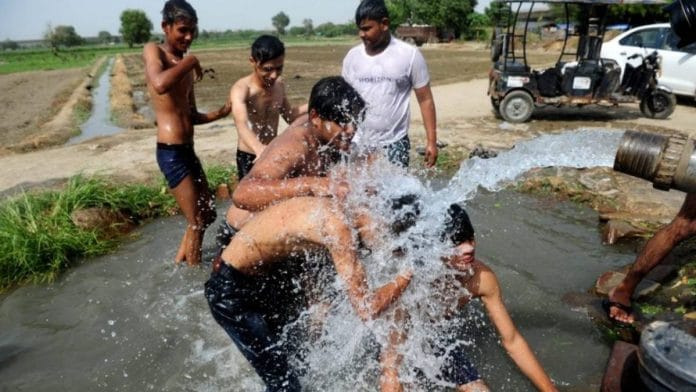New Delhi: Heat-related morbidity and mortality are “projected to increase further as climate change progresses, with greater risk associated with higher degrees of global warming,” researchers of a two-part series on health and heat have warned, recommending that measures to reduce climate change be taken immediately.
The paper, published in Lancet Friday, stated that higher levels of heat may “increase adverse pregnancy outcomes and negatively affect mental health”, apart from reducing “physical work capacity and motor-cognitive performances, with consequences for productivity, and increase the risk of occupational health problems”.
To mitigate the effect of heat on our bodies and economy, the team of international researchers recommend implementing sustainable, “evidence-based cooling strategies”, such as planting more trees and installing more insulative materials in buildings.
“Two strategic approaches are needed to combat extreme heat. One is climate change mitigation to reduce carbon emissions and alter the further warming of the planet. The other is identifying timely and effective prevention and response measures, particularly for low-resource settings,” series co-lead author Dr Kristie Ebi, University of Washington, said in a statement.
The series closely follows the UN Intergovernmental Panel on Climate Change (IPCC)’s report on global warming, which predicted that temperatures are likely to reach 1.5 degrees Celcius above pre-industrial levels in the next 20 years. The consequence of this will be more extreme weather, including severe heat and heatwaves.
Another study, ‘Global Burden of Disease’, published in the Lancet this year has estimated that 3,56,000 deaths in 2019 were related to heat and that the number is expected to grow as temperatures rise worldwide.
The two-part series published Friday, however, stated these deaths are preventable should climate change mitigation strategies be put in place.
Also read: Extreme heatwaves in a warming world don’t just break records – they shatter them
The heat effect on our bodies
The first part of the series examines how heat affects the human body.
The paper explained that when exposed to heat, the body reacts in two ways — by “redistributing blood flow towards the skin (vasodilation) to improve heat transfer from muscles to skin and subsequently to the environment, and secreting sweat onto the skin, which subsequently evaporates and removes body heat”.
Heat stress can cause the body’s ability to regulate its internal temperature to malfunction, leading to heatstroke. Increased blood flow to the skin “increases cardiac demand while decreasing the heart’s filling pressure”, which in some cases can increase the likelihood of cardiac arrest or failure. It could also lead to nervous system damage and affect the liver and kidneys. It can also “indirectly contribute to an increased risk of communicable diseases,” like malaria, since people are less likely to use mosquito nets because of the heat.
Groups that are particularly vulnerable to extreme heat conditions include outdoor workers, infants, people above the age of 65 years, athletes, drug users and alcohol abusers, stated the paper.
“Achieving the Paris Agreement goal of limiting additional warming to below 2.0°C above preindustrial levels is projected to avoid substantial heat-related mortality,” the researchers said.
The researchers warned that “without investment in research and implementation of needed risk management actions, a very different future awaits many people and communities”, and added that “higher means and extremes of temperature will lead to future summers characterised by higher morbidity and mortality, and important limitations and changes to what are today considered normal activities”.
Also read: India to suffer more intense heat waves, heavier rainfall in future decades, IPCC report says
How heat effects can be mitigated
In the second paper, the researchers offered ways to mitigate the health effects of extreme heat, stating that “well-communicated heat action plans with robust surveillance and monitoring is essential for reducing the adverse health consequences of current and future extreme heat”.
Though air conditioning is set to become the most popular way to reduce heat strain, the paper pointed out that it is “unaffordable for many of the most vulnerable, financially and environmentally costly, and leaves many defenceless from extreme heat during power outages”.
The researchers suggested mitigation strategies like building shading infrastructure, planting more trees and grass, and increasing urban ventilation. Other recommendations include cool coatings on building roofs, insulation, and window shading.
At an individual level, the researchers said, people can stay cool by using electric fans, dousing or spraying themselves with water, immersing their feet in water, using cold towels, and taking breaks during physical activity.
The researchers also suggested implementing these strategies in particularly vulnerable areas such as slums, old age homes, schools, work places, and refugee camps.
“The effectiveness of different strategies depends on their compatibility with a particular setting,” stated the paper, adding, “Irrespective of the setting, recommended actions should be driven by the latest scientific evidence and not conventional wisdom that was developed during cooler periods”.
(Edited by Poulomi Banerjee)
Also read: We can take the heat, usually. But more heat waves are dangerous






